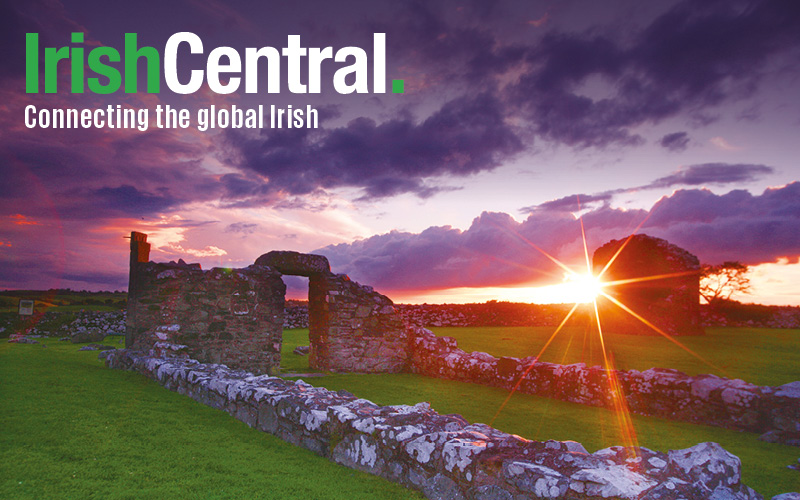America has loomed large in the Irish political imagination for centuries for good reason. By the start of the 20th century the Irish American population in the United States was larger than the population in Ireland itself.
In the 19th century America became the nation that Irish republicans immediately looked to for inspiration and support (and they often found both, sometimes treating the place like an early ATM).
That helps explain why America was the only country that was singled out in the 1916 Proclamation. Sending significant financial and political support back to the homeland for generations was noticed.
In "Ireland’s Exiled Children: America and the Easter Rising," Robert Schmuhl, chair of American studies and journalism at Notre Dame, has written a lucid, scholarly study of the unique trans-Atlantic bonds that linked the two countries before and after the Rising.
In the book Schmuhl considers four key figures who helped shape Irish America’s response to news of the rebellion in Ireland. First he chooses John Devoy, the ardent Fenian who was arguably the most influential political voice among Irish Americans of the era.
Then he considers the American poet and journalist Joyce Kilmer, whose fine reporting helped shape public opinion and guide its sympathy in the immediate aftermath of the Rising. Thirdly he considers the legacy of the discreetly anti-Irish President Woodrow Wilson, who was himself descended from Ulster Protestants and implacably opposed to Irish independence.
Finally Schmuhl considers the man whose American birth – to hear many, though by no means all tell it – saved him from execution in 1916, Eamon de Valera. The contrasting backgrounds of his central protagonists mirror the complexity of the Rising itself and the diversity of responses it evoked in the U.S.
What is striking is how many voices fought to anchor the event and its meaning, right from the outset. Early reports came from England and were filtered through its perspective, and rumors were often reported as fact.
Some initial reports had it that the Rising's leaders had been shot in London, not Dublin, Schmuhl reminds us, while others made wild claims about the conduct of the volunteers and the numbers killed in the battles that were waged. The treachery of striking a blow in Dublin while England was contending with zeppelins and u-boats enraged many in Whitehall.
But many others saw a small nation take a defiant stand against their historic oppressors at a juncture in history when it was certain to have a lasting impact. Schmuhl quotes Mary McGrory, the legendary Irish American journalist and columnist, who described the 1916 Rising as “the only revolution which was fomented and fought by poets.”
Kilmer had come to a similar opinion, Schmuhl reminds us, even venturing to compare the Rising to a sort of movement in Irish art, suggesting it was “closely related to the work of the Gaelic League, to the Irish Theatre movement, and to that phase of literary activity which is termed the Celtic Renaissance… The leaders of the movement were, for the most part, men of letters.”
Interest in the shocking revolt kept the story on the front page of The New York Times for weeks. Americans were astounded that a small band of Irish revolutionaries had dared to take on the might of the British Empire, and readers followed each new report ardently.
Knowing from the outset that the Rising was doomed to fail yet determined nevertheless to make the supreme gesture, the leaders had keenly understood the power of symbolism and they knew their actions would reverberate for decades to come. Even George Bernard Shaw appreciated the contradiction, describing the Rising as “silly, ignorant, wrong headed – but honorable, brave and republican.”
The poet W.B. Yeats, more than most, understood its power and wrestled with its legacy for the rest of his life. In a letter written about a month after the Rising he confessed to an American friend, “This Irish business has been a great grief. We have lost the ablest and most fine natured of our young men. A world seems to have been swept away...”
That the leaders of 1916 were composed of some of the most accomplished political thinkers of the age is a given. That they also included some of the most accomplished writers and thinkers of the era has been less remarked on.
In their wisdom (or their fury) the British decided to remove their threat by executing them one by one, leaving a political power vacuum it would take the nation decades to recover from, retarding progress toward a peaceful settlement on all sides.
In his praiseworthy work, Schmuhl reminds us how much Irish America contributed to the legacy of 1916 and its aftermath in a book that brings an important new perspective to Rising studies.
Oxford, $29.95.




Comments